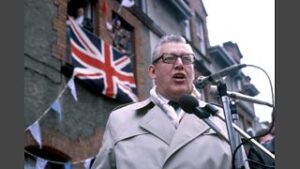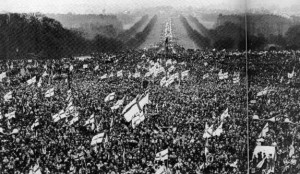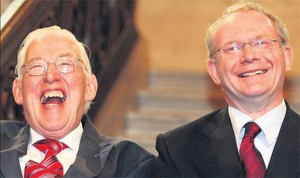Podcast: Ian Paisley with Ed Moloney

Cathal Brennan and John Dorney interview journalist Ed Moloney on the career of unionist leader Ian Paisley. First broadcast on the Irish History Show.
Ian Paisley began his career in public life as a firebrand Protestant preacher, who founded his own church, the Free Presbyterian Church in the 1960s. He criticised existing Protestant denominations for their embrace of ‘ecumenism’.
Since, in Northern Ireland, religion and politics were tightly entwined, it was not surprising that Paisley also became a leadership figure for militant unionists and loyalists. One of his first prominent acts in this regard was leading a crowd to attempt to remove an Irish tricolour displayed by Sinn Fein candidate Billy MacMillen from Divis Street in Belfast in 1964, provoking a serious riot.
Paisley was also vocal in condemning toleration in the North of the 1966 Easter Rising commemorations and the meetings between Northern Prime Minister Terence O’Neill and southern Taoiseach Sean Lemass.
However it was the actions of him and his supporters in physically attacking the Civil Rights marches of 1968-69, particularly one at Burntollet, outside of Derry, that were widely seen as helping to start the Northern Ireland Conflict or ‘Troubles’.

Thereafter, Paisley and his political party – initially the Protestant Unionist Party, later renamed the Democratic Unionist Party – remained opposed to several efforts to resolve the conflict through ‘power-sharing’. In 1974 they participated in the Ulster Workers Council Strike – general strike that brought down the 1974 Sunningdale agreement, though Paisley himself spent much of the time in Canada.
In 1977, Paisley attempted to repeat the success of 1974 with another strike aimed at ‘restoring majority rule’ in Northern Ireland, but this one was successfully broken by the British military.
‘Never Never Never’
In 1985 Paisley again led unionist opposition to the Anglo-Irish Agreement signed between British and Irish governments, giving the latter a consultative role in Northern Ireland. Paisley famously gave a speech before a crowds tens of thousands strong outside Belfast City Hall stating that he would ‘never, never, never’ accept the Agreement. In the wake of it, Paisley helped to found a short-lived paramilitary group Ulster Resistance. Though the group had a short life span, many of the weapons it imported passed to other loyalist paramilitaries.
Once again in 1998 Paisley campaigned against the Good Friday Agreement that effectively ended the Northern Ireland conflict. He was particularly critical of Ulster Unionist leader David Trimble allowing Sinn Fein into power-sharing government before the IRA had given up its arms.

However, at the very end of his life, Paisley apparently had a sea change, signing the Saint Andrews agreement in 2006 and entering in government himself with Sinn Fein.
The IRA had decommissioned its weapons the previous year, but the sight of Paisley’s apparently friendly relationship with former IRA commander Martin McGuinness was a bitter pill for many of his followers to swallow.
In 2008 he retired from politics, to be replaced as DUP leader by Peter Robinson. In 2011 he stepped down as head if his Church. He died in 2014.
Ed Molony, who we interview here, is the author, among many other works, of Paisley: From Demagogue to Democrat? He was a long-standing correspondent from Northern Ireland throughout the conflict there. You can find his website, the Broken Elbow, here.